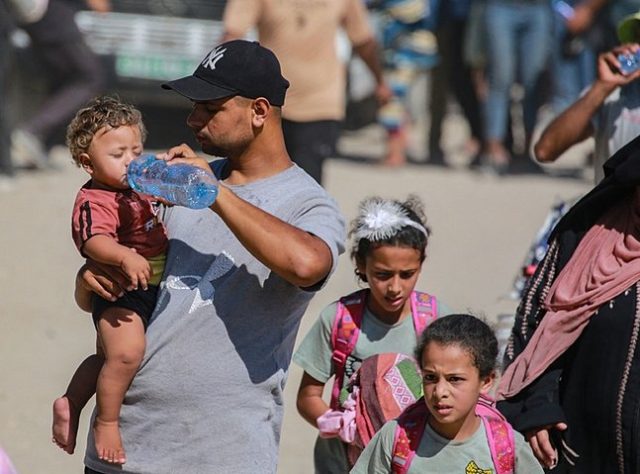Gazans are daily being exposed to Israeli attacks while waiting in line to access volumes of water well below the international standard required for survival in emergencies.
While the theme of World Water Week, organized by the Stockholm International Water Institute (SIWI) since 1991 and running from Aug. 25-29 this year is “Breaking Boundaries: Water for Peace and Sustainable Development,” the water scarcity caused by Israel in Gaza creates a barrier to achieving a peaceful and sustainable future.
Life in Gaza, where thousands have died due to an Israeli onslaught since Oct. 7 last year, continues under harsh conditions.
Palestinians who have lost their homes, land and livelihoods in the attacks are struggling to survive in tents set up by aid organizations or in schools and hospitals converted into shelters.
According to a report by the international aid organization Oxfam titled “Water War Crimes,” while 15 liters of water per person per day are needed for survival in emergencies, Gazans have access to only 4.7 liters for all their needs, including for cooking, bathing and cleaning.
This represents a 94% reduction compared to pre-Israel attack levels.
As of May 26, clean water production across the Gaza Strip had decreased by 84% due to infrastructure damage from attacks, fuel and electricity issues, and Israeli restrictions on the entry of water and sanitation supplies.
By June 3, Israel had destroyed all water and sanitation storage facilities in Gaza City and Khan Younis.
WAITING IN LONG LINES OR BUYING WATER
Before the Israeli attacks, 46-year-old agricultural engineer Muhammed Abu Ouda lived a normal life with his wife Halla, 39, daughters Sarah, 16, Asmaa, 10, Aya, 7, and son Ibrahim,14, in a 150-square-meter apartment in the Ash Shati refugee camp in western Gaza City.
The attacks have since drastically changed their lives.
Ouda, who lost his home and job in the attacks and is now staying with his sister in Al-Mawasi, Khan Younis, told Anadolu that despite significant difficulties, they have managed to survive thanks to aid from relief organizations.
He noted that this aid has become essential for his family, but they are still facing serious challenges in finding food and water.
Ouda said he has to wait in long lines at water sources several times a day or pay to get water.
He described how while waiting in line to fill water containers, two nearby houses were bombed twice.
“Allah protected us, but we were very scared each time as rocket debris and fragments from targeted houses came towards us, injuring people,” he said.
Ouda said they face difficulties in finding both household and drinking water.
He and his son Ibrahim go out early every morning to search for water, and after waiting for hours at a water source, they manage to collect just one liter per person for use at home.
Ouda emphasized that when additional water is needed during the day, they must queue again, resulting in the loss of both time and energy due to the distance of water sources from their home.
“Another option is to buy water. We pay about 25 cents for 20 liters of water used at home, and clean drinking water costs about $1 for 20 liters. We need at least 160 liters of water daily for our home. The amount we can get varies based on aid, free water sources and our financial situation. However, we manage to get at least 100 liters for home use and 20 liters for drinking,” he said.
He added that since they have no purification equipment, they try to make the water cleaner and more usable using cloth or cotton.





